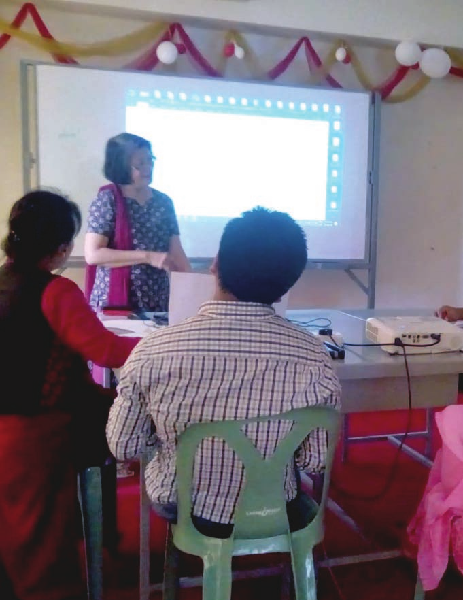Eunice has worked and travelled in many countries in South Asia and East Asia. She enjoys learning the many languages there and learning from the people.
I have been asked many times how one can learn a new language. I am no expert in language learning but over the years, I have come to understand what works for me. I think one of the most important factors in language learning is the motivation factor. Why do I want to learn the new language?
Initially, in most of the countries I have worked in, it is basically the need to survive and to communicate with people and that was sufficient motivation to reach a very basic level of language proficiency. After that, most language learners can experience a plateau in their language learning unless something more motivates them. So eventually, it was the need to use it in my work and also the desire to be able to help the people better that helped me to achieve a higher level of language proficiency. I needed to write books, I needed to train the teachers, I needed to understand the people and have a deeper level of communication with them. As I continue to immerse myself in the area of linguistics, I realized that deep down within me God created me with a deep desire to communicate just as He Himself is a God who communicates and has given us this gift of languages.
Before I went out to the field, I went for Linguistic training in Singapore. There I learned a lot about languages – how to analyze the grammar and sounds of the language and what it takes to write an unwritten language. And I learned how to learn a new language. This certainly has helped me to learn a language more effectively and quickly. But I have also learned that unless I learn them in the language environment, all is in vain for me. Above all, my work with languages and my passion to learn them is also my way of expressing thanks to God for His wonderful creation of languages and the people who speak them. It is my expression of worship to God.
Maintaining the Language
After you have put in a lot of effort and time, you can now speak a language at a confident level. But maybe your stay abroad is over and it is time to go home. Unless it has sparked a lifelong interest in the language and you are ready to put in much work to maintain this language, you will find that you can actually forget these languages. A consequence of this is that as much experience as I have in learning and speaking languages; some of which I can now say I speak fluently, I have plenty of experience too in forgetting languages.
I personally think it is the language proficiency level that you have achieved in learning the language that will determine whether you will forget the language. I often use the five levels of Proficiency Levels based on LAMP by Brewster and Brewster to determine language proficiency:
At level
- you are able to satisfy minimum courtesy requirements and maintain very simple face-to-face conversations and satisfy limited social demands.
- you are able to satisfy most work requirements with language usage that is often but not always acceptable and effective.
- you are often able to use the language to satisfy professional needs in a wide range of sophisticated and demanding tasks.
- your speaking proficiency is regularly superior in all respects and is usually equivalent to that of a well-educated native speaker.
- you are a well-educated native speaker and reflects the cultural standards of the country.
I believe that if you have achieved level three plus, that is, if you have spent sufficient time in your language environment, you will not forget the language easily. You will only forget it if you are not using it. So just as you are passionate about languages, also be passionate about using them.

Language Learning is Ministry itself
Those who learn the language of the host find themselves more useful in disciple-making and also assimilate better into life in the host country. And in many cases, they are able to stay on longer and feel a sense of belonging to the host country.
When I had to learn a Persian dialect in the slums of Karachi, there was not a school I could go to. I made frequent trips to the slums and visited a few families that had many women folks. I could only mingle with the women folks and with children, so these became my teachers. Most of them could only speak in their own mother tongue. I diligently jotted down everything they said that I could understand and thought was useful in my little notebook. They were curious that I could reproduce what I wrote intelligibly. After a while when they could see that I had made progress with production and receptive skills, they were convinced that this method of jotting down notes in my notebook was key to my learning. Once in a while, I would feel a little lazy to jot it in down and they would point at my notebook and shout across the room, “Write it down, write it down!” In no time, they became my very good friends. Few people have real friends they could trust and we soon became included in this little circle of friends whom they could trust and bare their deepest thoughts. And when you make one close friend, you have become the trusted and respected friend of everyone in her extended family as well.
Everyone can learn a second or third language
Whenever someone tells me that they are not gifted in language learning, my first response to them is to ask them if they speak their first language well enough, and if they understand the culture of their first language. Then I proceed to ask them if they speak a second language well enough. And if they say they do, then I will go ahead to reassure them that it will not be diffcult for them to learn a third or a fourth language. Speaking your first language may be second nature, but that does not necessarily mean you understand it well.
Listening is central to language learning.
Very few language programs give importance to listening as a central skill, as opposed to grammar and vocabulary. Listening is difficult, as it may seem like passive activity compare to speaking. So a foreign language learner may need to devote time to actively listening to your target language. Children get top marks for imitating tones, rhythms and sounds of a language. They are perhaps more sensitive to this than adults and they are not shy to imitate them. I was in a restaurant in Chiangmai with a family from India. When the children were asked what drinks they would like, the little six-year old girl replied, “Kokaakolaa” with the perfect intonation of the Thais. They have been in Thailand for a few days then, and had learnt to say ‘thank you’ in the local language. It was pretty obvious that they had sounded CocaCola like ‘Khob khun ka’. What was amazing to me was that the first thing the children caught was the intonation in the language. And the locals loved it when they hear them speak English like them.
Pronunciation
Flawless pronunciation is not fundamental to communicating in a language, but the listeners will understand you better if you can train yourself to avoid the most common errors in pronunciation. People who are learning English as a second language often possess very particular accents because of the habits they have formed in their native language. Fortunately, there are always tricks to elevate you from pronunciation purgatory to enunciation ecstasy. Some training in Linguistics helps but essentially you must be prepared to acquire some new habits too.
It is also important to watch the facial expressions of the speakers when they talk. Different languages make different demands on your tongue, lips and throat. Pronunciation is just as much physical as it is mental. Then try pronouncing the word with the same expression. It might be difficult to acquire these kinds of habits when you are speaking at the beginning but you will as you practise. If you can’t watch and imitate a native-speaker in person, watching foreign-language films and TV is a good substitute.
Sometimes I just sit and listen to these people talk and watch their expressions and try to offer a phrase or two. When I say something terribly wrong because I have used a lengthened vowel or the wrong consonant, they rocked with laughter. I feel embarrassed but most of the time, I feel secretly happy, for I know that I have brought some laughter into their homes. It is no wonder some of my local friends often say to one another when they hear I am visiting, “Eunice is coming, we will have something to laugh about!” It is rightly said that one of the keys to learning is to take on certain childlike attitudes, for example, lack of self-consciousness and the willingness to make mistakes. Admitting that you do not know everything (and being okay with that) is the key to growth and freedom. Willingness to make mistakes means being ready to put yourself in potentially embarrassing situations.
Fluency is more impressive than accuracy
A friend of mine is an extrovert while her husband, a very learned scholar, is more an introvert. Her goal is to communicate whereas he would aim to speak accurately. So, he speaks slowly and haltingly, pausing to look for the right words to use, whereas she mixes a word of two of English whenever she does not know a certain word. As a result, she responded much faster than her husband. Once the people in the little village were overheard discussing with one another about the couples’ language abilities. “She is so fluent and so much smarter than her husband – he does not speak much of our language!” the leader of the group concluded.
Learning by Full Immersion
So you can see now why I love to be fully immersed when I am learning a language. I learnt swimming by diving in, and I think I learn language best by diving in as well. Being able to have a simple conversation with the locals is a huge reward in itself. Reaching milestones like that early on will make it easier to stay motivated and keep practicing. Some people will be patient and offer you good advice how to learn their language well, including telling you that you need to eat more chillies like them.
The Reward of Learning a Language
“If you talk to a man in a language he understands, that goes to his head, if you talk to him in his language, that goes to his heart” (Nelson Mandela). Like what Nelson Mandela said, I can now talk to the many foreign friends that God has given me and I am so grateful that I can learn from them. I am eternally grateful to the Lord for letting me grow up in a Malay village amongst neighbours who spoke Tamil, Hokkien, Cantonese and Malay. The Lord has given me a good heritage.



